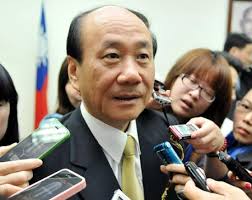All FTA talks shelved over service pact protests: Taiwan minister

CNA | April 22, 2014
All FTA talks shelved over service pact protests: minister
TAIPEI—All free trade negotiations with Taiwan planned for this year have been shelved by “other countries” because of unrest over the services pact with China, Economics Minister Chang Chia-juch (張家祝) said Monday, though he refused to name any specific countries.
Chang told the Legislature’s Economics Committee that many countries have grown hesitant and indefinitely postponed scheduled talks after the weeks of protest and ongoing controversy over the service trade pact that have gripped the country and, at one point, ground the Legislature to a halt.
Names of Countries Confidential
Accused by Democratic Progressive Party Legislator Hsiao Bi-khim (蕭美琴) of making threats to scare the public, Chang said that he and his ministry are not at liberty to reveal the names of countries interested in talks with Taiwan.
Chang defended his stance and said that as a Cabinet minister, he will not make comments without solid evidence.
He stressed that foreign nations’ concerns over trade deals with Taiwan are not because of the student-led protests against the China services pact, but are rather a result of the wider controversy over the agreement itself.
The trade-in-services pact has been stalled at the Legislative Yuan since shortly after it was signed in June last year. Supporters, including the administration, say it is vital to Taiwan’s economy, while opponents worry about local businesses and political motivation on the part of Beijing.
Student protesters launched an occupation of the Legislature’s main chamber that lasted 24 days to show their opposition to how the pact has been handled, effectively blocking most lawmaking activities until they left on April 10.
Chang Dismisses Ex-AIT Chief’s Comments
A former U.S. envoy said in an interview published yesterday that the services pact with China is not needed for Taiwan to pursue other trade deals, comments that Minister Chang called regrettable and uninformed.
The Chinese-language Liberty Times published that day an interview with former American Institute in Taiwan (AIT) Director William Stanton, who said that the controversial cross-strait deal with Beijing does not relate either directly or indirectly to Taiwan’s chances at entering the Trans-Pacific Partnership (TPP), a free trade bloc.
The comments by Stanton, who was the de facto U.S. representative at AIT’s Taipei office from 2009 to 2012, went against President Ma Ying-jeou’s repeated calls that passing the cross-strait services pact is a necessary first step before Taiwan can join regional trade blocs.
Now the director of the Center for Asia Policy at Taiwan’s National Tsing Hua University, Stanton said the United States does not consider the Economic Cooperation Framework Agreement (ECFA) of 2010 or other deals with China to be representative of regular FTAs because the agreements are meant to promote Beijing’s political goals.
Speaking later Monday, Minister Chang said it was "regrettable" that Stanton apparently "does not understand" Taiwan’s economic plight despite living on the island for so long.
Would-be TPP Memebers Influenced by China
While the U.S. may not consider ECFA a necessary step, there are 11 other countries in negotiations to join the TPP which are subject to major influence from China, Chang said during a monthly meeting of the Presidential Office.
Washington itself has said Taiwan needs all 12 member states to come to a consensus in order for Taiwan to participate, he noted.
But since China is the biggest or second-biggest trade partner for most of those countries, he said, Taiwan will need to neutralize China’s influence before it can join the TPP or the Regional Comprehensive Economic Partnership (RCEP). He cautioned that if that does not happen within three years, Taiwan will end up marginalized in the world economy.
Chang admitted that other countries will not necessarily sign FTAs with Taiwan just because of ECFA, but without the landmark pact with China, he argued, there would be no chance at all of more trade deals.
"It is a necessary path," he said of ECFA.





